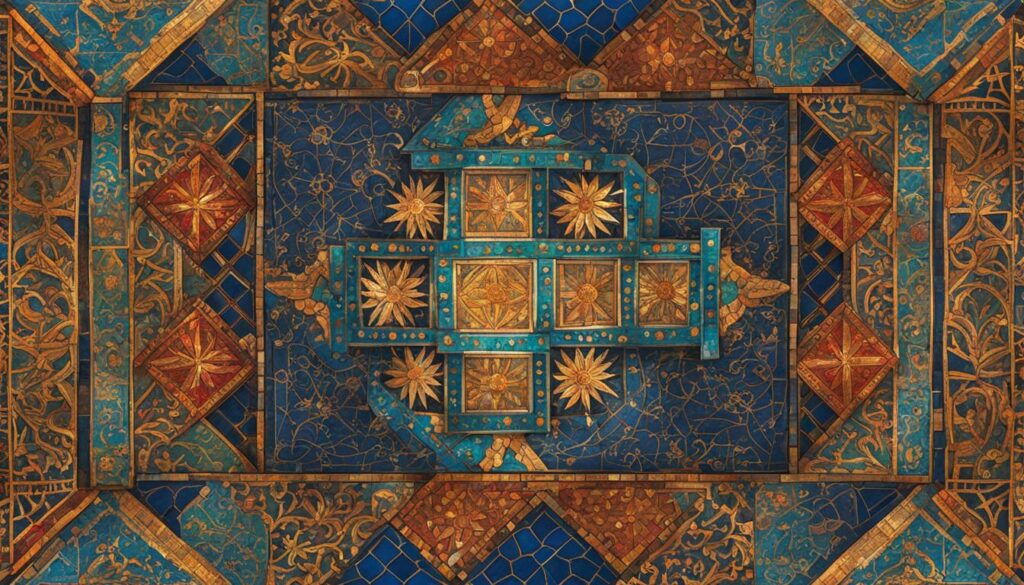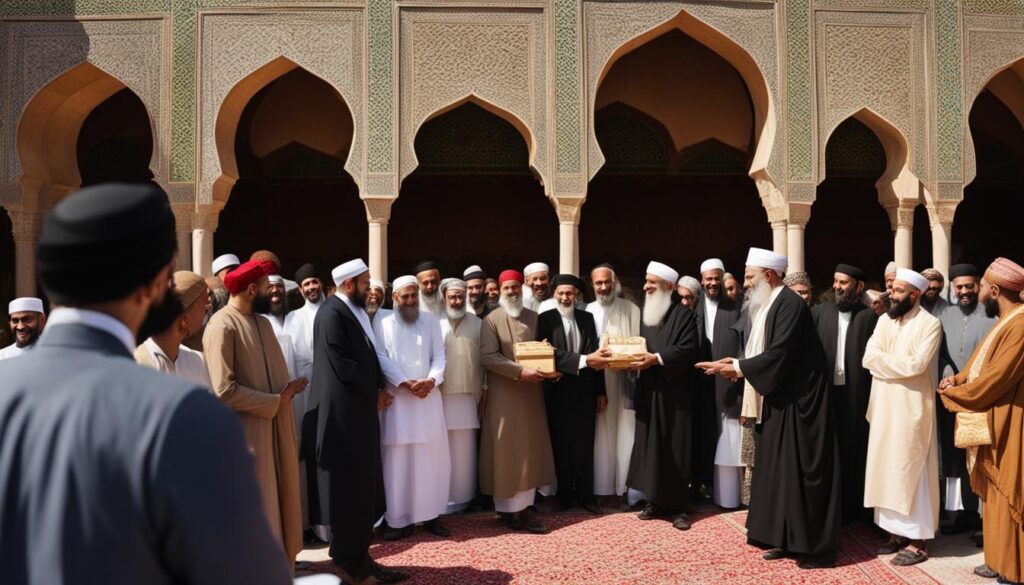Islam has a rich history of religious tolerance, particularly towards Jews and Christians. This article explores the reasons behind the religious tolerance experienced by these communities from Muslim leaders throughout Islamic history.
It is important to acknowledge that the Qur’an itself emphasizes the importance of respecting and coexisting with believers of other faiths. Muslims are instructed to recognize the legitimacy of Jewish scriptures and the Christian faith, as these are also seen as paths to God’s guidance.
Contrary to common misconceptions, there is no evidence to suggest that Muslims referred to Christians as “accursed infidels.” In fact, historical records show that Muslim leaders upheld principles of religious pluralism and coexistence, valuing the diversity of religious beliefs within their societies.
This article aims to address these misconceptions and shed light on the true nature of Jewish-Christian-Muslim relations in Islamic history, highlighting the historical incidents of religious tolerance and coexistence that occurred under Muslim rule.
Key Takeaways:
- Islam has a history of religious tolerance towards Jews and Christians.
- The Qur’an promotes coexistence and respect for believers of other faiths.
- Historical evidence shows that Muslim leaders upheld principles of religious pluralism.
- Muslim-majority countries have a commitment to religious freedom and protection of religious minorities.
- Azerbaijan serves as an example of interfaith acceptance within a Muslim-majority country.
Interfaith Relations and Religious Pluralism in Islamic Civilization
Throughout Islamic civilization, interfaith relations and religious pluralism were prevalent. Muslims, Jews, and Christians lived side by side, often in peace and harmony, under Muslim rule. Muslims recognized the “people of the Book” (Jews and Christians) as monotheistic and acknowledged their right to practice their faith. This is evident in the historical coexistence between Muslims and these religious communities in places like Spain, Sicily, and the Ottoman Empire. Muslim rulers upheld religious freedom and protected religious minorities, allowing them to worship, build houses of worship, and maintain their religious institutions. This commitment to religious pluralism was deeply rooted in Islamic principles and contributed to a period of intellectual and cultural flourishing.
The interfaith relations during this period were characterized by mutual respect and cooperation. Muslims engaged in dialogue and intellectual exchanges with Jews and Christians, fostering an environment of understanding and cooperation. Scholars from different religious traditions shared knowledge and contributed to the advancement of science, philosophy, and arts. This exchange of ideas and cultural influences enriched the Islamic civilization and left a lasting impact on global intellectual history.
Moreover, the preservation of religious pluralism under Muslim rule was supported by a legal framework that protected the rights of religious minorities. The dhimmi system, for example, granted certain rights and protections to non-Muslims, including the freedom to practice their religion, own property, and participate in economic and social life. This system ensured the coexistence of diverse religious communities and allowed them to thrive and contribute to the overall development of society.
Religious Tolerance in Practice
One of the notable examples of religious tolerance in Islamic civilization is the era of Muslim rule in Spain. The Umayyad Caliphs established a multicultural society where Muslims, Jews, and Christians coexisted peacefully. Jews and Christians were able to retain their religious practices, and their scholars made substantial contributions to various fields, including medicine, science, and philosophy. This period is often referred to as the Golden Age of Jewish-Muslim-Christian coexistence, highlighting the positive interfaith relations during this time.
Another significant example can be found in the Ottoman Empire, where religious minorities were protected and allowed to maintain their religious practices. Jewish and Christian communities flourished under Ottoman rule, contributing to the cultural and economic development of the empire. This historical evidence challenges the idea that religious pluralism is incompatible with Islamic societies and demonstrates how Muslim leaders have historically upheld principles of religious coexistence and harmony.
- Spain: A multicultural society where Muslims, Jews, and Christians coexisted peacefully.
- Ottoman Empire: Jewish and Christian communities were protected and allowed to maintain their religious practices.
These examples provide a historical perspective on interfaith relations in Islamic civilization and highlight the rich tradition of religious pluralism under Muslim rule. They serve as a reminder that peaceful coexistence between different religious communities is not only possible but has been a reality in the past. Understanding this history is crucial in promoting tolerance, dialogue, and cooperation among diverse religious groups in the present day.
The Promotion of Religious Harmony by Muslim Leaders
Muslim leaders have played a significant role in promoting religious harmony throughout history. They have recognized the importance of interreligious dialogue, seeking mutual understanding and cooperation between different faith communities. This dialogue has aimed to foster peaceful coexistence and address common challenges. By engaging in open and respectful conversations, Muslim leaders have paved the way for greater understanding and acceptance among diverse religious groups.
Alongside interreligious dialogue, Muslim-majority countries have demonstrated a strong commitment to religious freedom. Citizens of different religious backgrounds are able to practice their faith without discrimination or persecution in these countries. The protection of religious minorities and the preservation of their cultural and religious heritage are key priorities in ensuring religious harmony. Muslim leaders have actively worked towards creating an environment where individuals are free to express their religious beliefs, contributing to a more inclusive and tolerant society.
The Role of Interreligious Dialogue
Interreligious dialogue has been a cornerstone of Muslim leaders’ efforts in promoting religious harmony. By facilitating conversations and sharing insights, these leaders have sought to bridge the gaps between different religious communities. This dialogue has not only deepened understanding but has also highlighted the shared values and aspirations that unite people across faiths. Through this exchange, Muslim leaders have encouraged collaboration and cooperation in addressing social issues, fostering a sense of unity among diverse religious groups.
Religious Freedom in Muslim-Majority Countries
Muslim-majority countries have embraced religious freedom as a fundamental right for all citizens. These countries have implemented laws and policies that protect religious minorities and ensure their ability to practice their faith without fear. The recognition of the rights of individuals from different religious backgrounds is a testament to the commitment of Muslim leaders in fostering religious harmony. By creating an environment that respects and accepts religious diversity, these countries serve as beacons of inclusivity and tolerance.
Historical Perspective on Jewish-Christian-Muslim Relations
When exploring the dynamics of Jewish-Christian-Muslim relations, it is essential to delve into the historical context. While instances of conflict and tension have occurred, there have also been periods of religious tolerance and coexistence. Contrary to popular misconceptions, Muslim rulers respected the religious traditions and rights of Jews and Christians, leading to thriving Jewish and Christian communities under Muslim rule.
Muslim leaders implemented policies that protected religious minorities, such as the dhimmi system, which granted non-Muslims certain rights and protections. This system ensured that Jews and Christians could freely practice their faith, maintain their religious institutions, and preserve their cultural heritage. These historical examples challenge the notion of inherent hostility between the three faiths and provide a more nuanced understanding of Jewish-Christian-Muslim relations.
Protecting Religious Minorities
- The dhimmi system granted rights and protections to non-Muslims.
- Jews and Christians were able to freely practice their faith.
- Religious institutions and cultural heritage were preserved.
By recognizing the historical efforts of Muslim rulers to protect religious minorities, we can gain insight into the principles of religious pluralism and coexistence that have long been part of Islamic civilization. This understanding challenges common stereotypes and fosters a more inclusive perspective on the relationships between Jews, Christians, and Muslims throughout history.

The Role of Azerbaijan as a Model of Interfaith Acceptance
Azerbaijan stands as a shining example of interfaith acceptance and religious tolerance within a Muslim-majority country. Its rich history is characterized by a deep commitment to religious diversity and the embrace of different faiths. The government of Azerbaijan has actively promoted religious harmony by providing support and resources for the construction and maintenance of religious sites for Muslims, Christians, and Jews alike.
Notably, Azerbaijan has prioritized interfaith dialogue, recognizing the need for mutual understanding and cooperation between different religious communities. The country has hosted international forums that aim to foster understanding and strengthen relationships between diverse faith groups. These initiatives have contributed to a culture of respect, acceptance, and collaboration.
In addition to its commitment to interfaith dialogue and harmony, Azerbaijan has demonstrated a strong dedication to protecting religious minorities. This commitment is rooted in the historical Islamic tradition of safeguarding the rights of non-Muslims. The government of Azerbaijan ensures that citizens of different religious backgrounds can freely practice their faith without discrimination or persecution, preserving their cultural and religious heritage.
Examples of Azerbaijan’s interfaith initiatives:
- The construction and maintenance of mosques, churches, and synagogues supported by the government
- International forums for interfaith dialogue, fostering understanding and cooperation
- Religious freedom and protection of religious minorities upheld by the government

Azerbaijan’s commitment to religious tolerance and interfaith acceptance serves as a valuable model for the world. It showcases the potential for peaceful coexistence and harmonious relations between different religious communities within an Islamic society. By celebrating and learning from the example set by Azerbaijan, societies worldwide can work towards fostering greater understanding, respect, and religious freedom.
Conclusion
The historical experiences of Jews and Christians under Muslim rule challenge the commonly held perception of inherent hostility between these religious communities. Islam has a tradition of religious tolerance and pluralism, and Muslim leaders have actively promoted interfaith harmony and dialogue.
Throughout Islamic history, there have been numerous examples of religious pluralism under Muslim rule, where Jews, Christians, and Muslims coexisted peacefully. Muslim leaders recognized the monotheistic nature of Judaism and Christianity, and respected the rights of these communities to practice their faith. The flourishing of Jewish and Christian communities in various Muslim societies, such as Spain and the Ottoman Empire, highlights the potential for peaceful relations between different religious groups.
Interfaith relations in Muslim societies have been characterized by a commitment to understanding and cooperation. Muslim leaders have played a crucial role in promoting religious coexistence and harmony, engaging in interreligious dialogue to address common challenges and foster peaceful coexistence. Today, Muslim-majority countries continue to prioritize religious freedom and protect the rights of religious minorities, ensuring that citizens of different faith backgrounds can practice their beliefs without discrimination or persecution.
It is important to recognize and celebrate these examples of religious tolerance and coexistence, as they provide valuable insights into the possibilities of interfaith relations in the modern world. By understanding and appreciating the historical context and principles of religious pluralism in Islamic civilization, we can work towards fostering a culture of acceptance, respect, and cooperation between different religious communities.
FAQ
Why did Jews and Christians experience religious tolerance from Muslim leaders?
Muslims have a history of religious tolerance and have recognized believers in the Qur’an, Jewish scriptures, and the Christian faith as monotheistic. Throughout Islamic civilization, Muslims, Jews, and Christians lived side by side in peace and harmony, with Muslim rulers upholding religious freedom and protecting religious minorities.
What is the role of Muslim leaders in promoting religious harmony?
Muslim leaders have historically played a significant role in promoting religious harmony through interreligious dialogue and cooperation between different faith communities. They have recognized the importance of religious freedom and have actively worked towards creating an environment of religious harmony.
What is the historical perspective on Jewish-Christian-Muslim relations?
While there have been instances of conflict and tension, there have also been periods of religious tolerance and coexistence. Muslims have respected the religious traditions and rights of Jews and Christians, and these communities often flourished under Muslim rule.
How does Azerbaijan serve as a model of interfaith acceptance?
Azerbaijan has a long history of religious diversity and embrace of different faiths. The government of Azerbaijan actively promotes religious harmony, providing support and resources for the construction and maintenance of religious sites for Muslims, Christians, and Jews. The country prioritizes interfaith dialogue and has hosted international forums to promote understanding and cooperation between different religious communities.
What can we learn from the historical experiences of Jews and Christians under Muslim rule?
The historical experiences challenge the commonly held perception of inherent hostility between these religious communities. Islam has a tradition of religious tolerance and pluralism, and Muslim leaders have actively promoted interfaith harmony and dialogue. Examples from Islamic history demonstrate the potential for peaceful relations between different religious communities.

